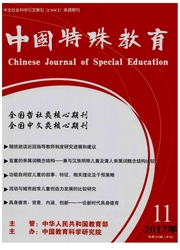

 中文摘要:
中文摘要:
从毕生发展的视角,针对不同年龄阶段学习困难者的特点,进行针对性的教育干预,符合各个年龄阶段个体的发展规律与成长需求,能更好地了解学习困难现象,有效地为学习困难者提供服务与帮助。目前,针对中小学阶段的学习困难者干预研究已有了较多研究成果,而对幼儿期、成年期的探讨还很有限;对于学习困难教育干预的效果评估还停留在元分析方法,且对心理健康方面的干预关注不足。未来可以进一步增加幼儿期、成年期学习困难者的教育干预研究,对其效果的评估也要注重实证、实验,同时应对学习困难者心理健康问题给予更多关注。
 英文摘要:
英文摘要:
Educational interventions based on the characteristics of those with leamiag disabilities at different ages, as well as their lifespan development, comply with the law of their grow and development. At present, much research is made into interventions in primary and secondary school students with learning difficulties, but little research is made into interventions in those in early childhood and adulthood; the intervention effects are as- sesscd merely by meta-analysis, and little attention is paid to mental health. Therefore, more research is expected to be made into interventions in those with learning difficulties in early childhood and adulthood, the intervention effects are expected to be assessed on an empirical basis, and more attention is supposed to be given to the mental health of those with learning disabilities.
 同期刊论文项目
同期刊论文项目
 同项目期刊论文
同项目期刊论文
 期刊信息
期刊信息
